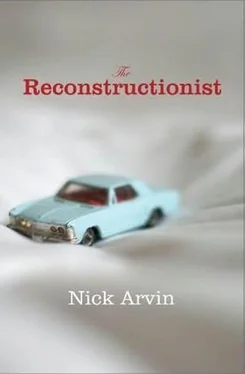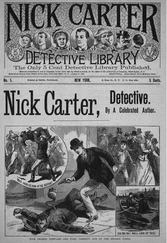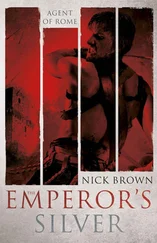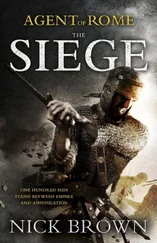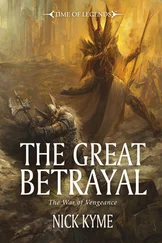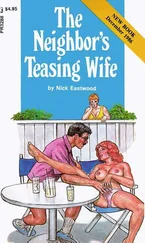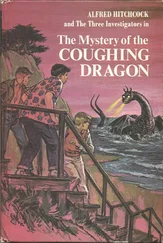Instead he walked, stumbling with confused balance, back toward the Cricket Bar. The minivan stood at the side of the road, doors open. The keys lay on the driver’s seat. A hole gaped in the dash where the radio had been. But in the armrest console between the seats, under a clutter of receipts, he found his credit card where he had left it. He locked the doors, took up the keys and began walking again. He was paced by phantoms at the edge of vision, white things and red things and black things. They scrambled forward only to retreat as he turned to see them better. The sun stood high and felt hot on the wound in his scalp. Its heat there grew as he walked, until it pressed like a blade.
A vehicle approached from behind, and he held himself from turning to look at it. A pickup, it went by scattering gravel from the tyres, not slowing.
He did not see another vehicle until miles later when he staggered into an intersection. More cars went by without stopping, and he kept on beside buzzing high-voltage lines held aloft by enormous steel armatures. He came to a gas station with a garage attached. A mechanic, sitting at a large accounts ledger on a grease-blacked tabletop, looked at him for some seconds before asking, ‘What happened?’
Ellis looked at himself, his clothes soiled and bloody. He said, ‘I’m not sure.’
The mechanic laughed.
HE FOUND -
The rural stretch of interstate alongside a pasture full of roan Arabians where a Nissan Armada swerved into the median, overturned, rolled into a Toyota Corolla in the oncoming lanes and bounced onward, killing three in the Nissan and two in the Toyota, and later a piece of human flesh was discovered in a windshield wiper of the Toyota, torn from one of the occupants as he was flung through the window opening.
The two-lane in front of yellow spiralling water park slides where a semi struck a Honda Pilot, which struck an Oldsmobile, sending it into the opposing lane to meet a Firebird head-on and everyone walked away except the driver of the Firebird, who was dead by the time anyone thought to check on him.
The highway between slouching hills where a Toyota Land Cruiser caught a wheel rim and rolled and the woman driving was decapitated as centrifugal forces pulled her through a window opening. Police photographed her head sitting upright on the earth, as if she had been buried to her neck by children.
And while he stopped at the places of accidents that he knew, he passed others all the time: he saw tyre marks on the asphalt and rutted into roadside gravel and earth, paint transfers on the Jersey barriers, dents in the guard rails, broken glass and plastic glittering.
He spent an hour, two hours, with his map spread on the steering wheel, gazing at the Xs, trying to see a pattern or approach that would bring him to Boggs. He could see no pattern, however, and the way the Wright jobs scattered around left no obvious candidates for a stakeout. Although in his work he often examined a photograph or a scene repeatedly in hope that some new evidence would present itself, here the field was too large, the map gave him nothing, and he couldn’t examine every accident scene repeatedly. He needed an intuition. He needed a way to shift his perceptions and see something new. Perhaps in this sense the girl in the junkyard had been right. But even though his situation appeared strange, even though memories and emotions shook and reeled inside him – still he failed to lose his sanity if that was what it was, failed to lose his mind even though his mind provided only this disorganised and apparently useless search.
He could not find an intuition, and along the way he also neglected his appearance. He grew embarrassed when he had to face people – gas station attendants, people passing an accident site. The minivan, too, looked bad. He wiped the windshield from time to time with a gas station squeegee, but the bodies of insects lay across the leading edge of the minivan in a continuous crust. He shoved receipts into the toothless mouth where the radio had been.
He slept one night in a field listening to the sound of cicadas like the cutting of a lathe. He slept another night in the open empty parking lot of a half-abandoned mall. The overhead lights pushed a glow that woke him repeatedly, thinking that he saw the sun, so that the night seemed to contain days that did not end, and when the sun did rise it had a taint of falsity. In the morning he circled the parking lot in the minivan and discovered a six-lane interstate below him where a thin mist had settled and commuters moved slowly. He went on, pressed by a logic grown inaccessible. As he fingered the stitches in his scalp, he wondered, how long had they been in? He was aware of losing a grip on time, of losing a grip on what he was doing, as if all that he could do was go on relenting to the movement of the road. Images of James Dell still occasionally startled him. He recalled Heather and a swirl of intense feeling came. ‘Heather,’ he cried aloud. Perhaps he had not even heard his own voice for a couple of days. Here on the road, he thought, it does not matter what I say. ‘Heather Heather Heather,’ he repeated until, over a score of miles, it became gibberish.
He stood before a dusty payphone in a mouldering 7-Eleven parking lot, thinking of her, but then, with shame scrabbling against the walls of his mind, he turned away. He looked at his hand and saw it shaking.
The day was beautiful. For miles uncountable wheat spanned everything not the road, a wind roiling it like water. A flock of starlings dove and wheeled. Then an odd, solitary half-timbered building was set off from the world by a rectangle of picket fence. A man worked over a fallen tree with a chainsaw. A retailer of farm equipment offered machines, green and yellow and shining. On the interstate he had the pleasure of accelerating again and moving among semis like a fish in a pod of whales. Bright billboards hove up out of the distance.
The trembling in his hand had spread – he looked at his legs trembling and felt muscles twitching in his face and in his hard, empty stomach. His grip on the steering wheel seemed to flutter. He set the cruise control so that he wouldn’t have to feel his foot shaking against the pedal.
He passed an enormous truck stop, semis crowding and nuzzling. He turned off the interstate and went through a little clapboard town and then twenty miles later another town that looked so much like the first that he spent a while trying to reason out whether he could have inadvertently circled. He turned onto a side road. One gentle hill after another curved him up and down. In his head his teeth chattered.
A side road teed out on the left, and Ellis stopped with his turn signal flashing, checked his mirror, then turned, in the same place where a Pontiac Grand Am had slowed to do the same thing and was struck from behind by a semi pulling a load of soybeans. An oncoming Chevy Lumina had swerved to avoid the collision, went off-road, and began overturning, killing its occupants, a family of four that had travelled six hundred miles to visit grandparents who lived two miles from the accident site. In the police photographs toys in primary colours lay scattered along the path of the rolling Chevy. Ellis got out and a wind pulled at his clothes. He recalled a photograph of the driver of the semi standing by his rig, bowed. And another photo, of the body of an obese child, face down on the earth, an enormous plastic soda cup inches from an outstretched hand.
After a time, scuffing in the grass, Ellis found a green pacifier, half buried. He had forgotten that the youngest was so young. Earth clung to the plastic and it trembled in his shaking hand. He felt cold at his core although the sun gaped bright and hot.
He sat by the edge of the road, huddled. A mouse skittered through the grass. A grasshopper stood a minute on his thigh, then leapt away. He picked a piece of asphalt from the crumbling edge of the roadway and let it rest heavy and warm in his hand. He set both hands on the road surface, to feel its absorbed heat. Then he lay down in the lanes, on their warmth, and watched the sky.
Читать дальше
